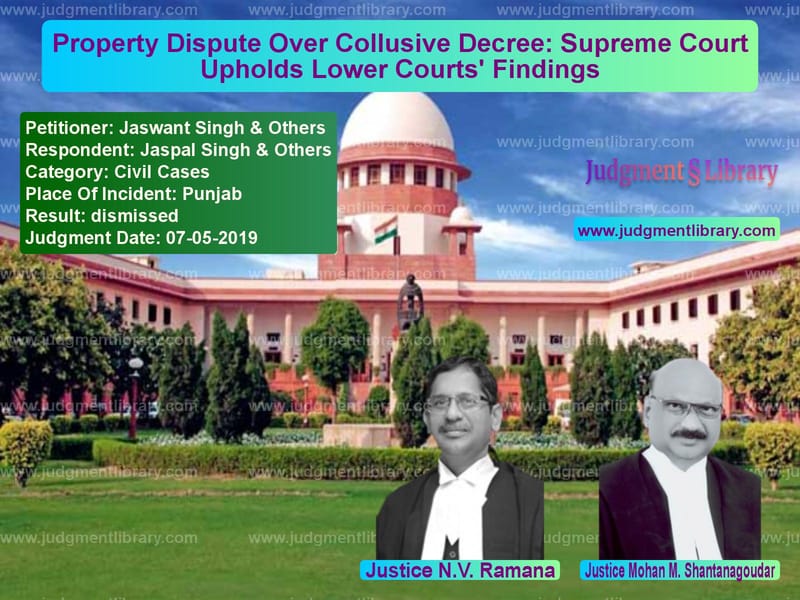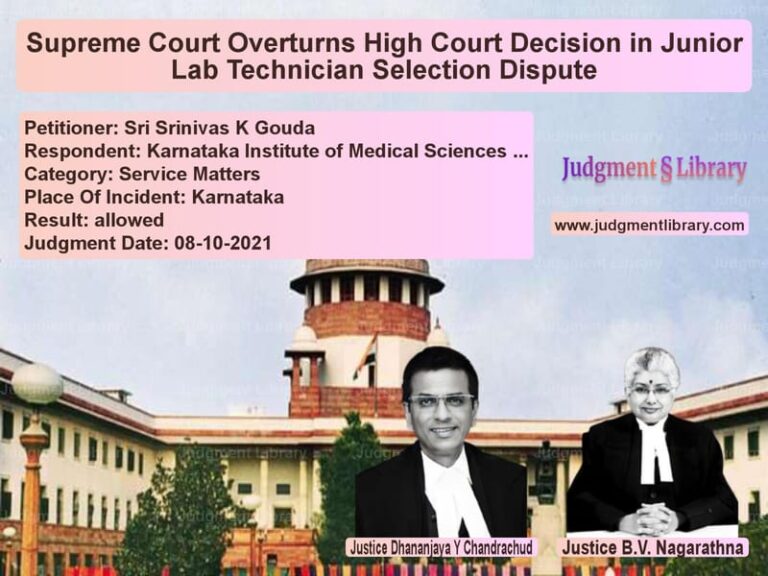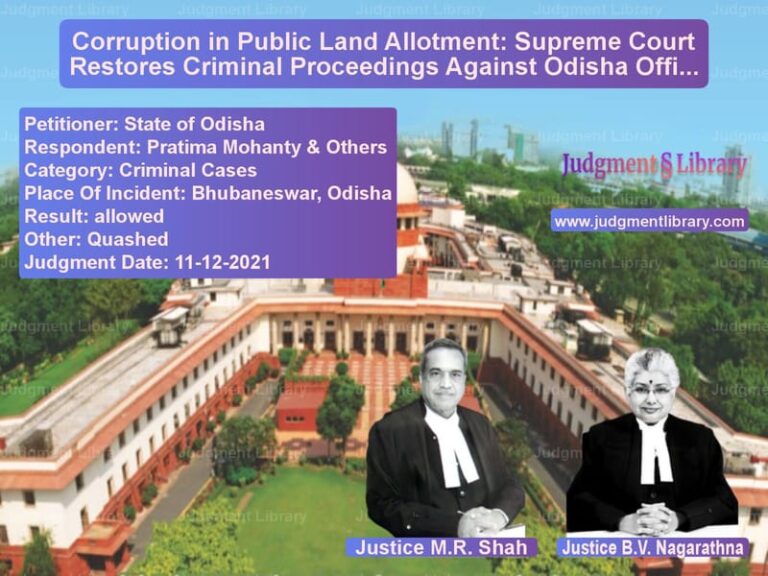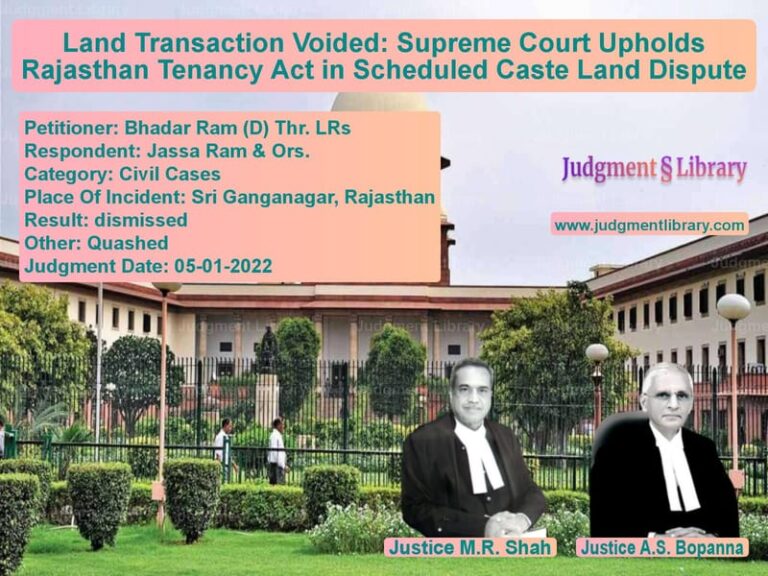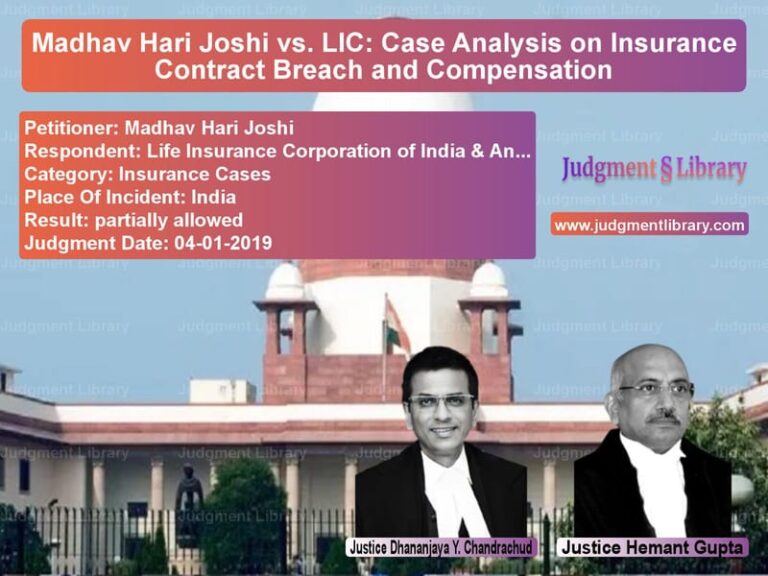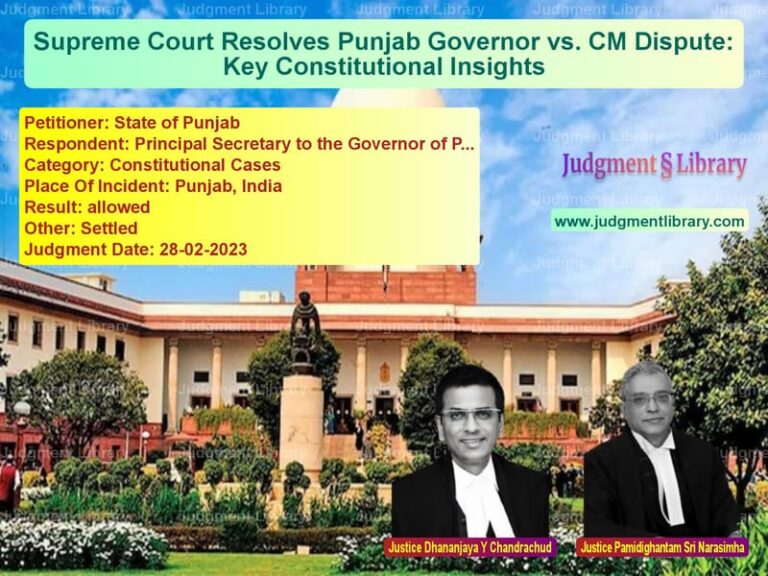Property Dispute Over Collusive Decree: Supreme Court Upholds Lower Courts’ Findings
The Supreme Court of India, in the case of Jaswant Singh & Others vs. Jaspal Singh & Others, ruled on a long-standing property dispute involving allegations of a collusive decree. The case revolved around the validity of a judgment and decree dated July 29, 1983, passed in Civil Suit No. 18 of 1983, which had declared certain defendants as the owners of the suit property. The Supreme Court upheld the concurrent findings of three lower courts, concluding that the decree was collusive and not binding on the plaintiffs.
The judgment is significant as it reinforces the principle that courts must scrutinize property transfer decrees to prevent fraudulent transactions and protect bona fide purchasers.
Background of the Case
The dispute originated when Jaspal Singh (Plaintiff No.1) filed a suit challenging the validity of a decree obtained in Civil Suit No. 18 of 1983, which had declared Defendant Nos. 1 to 3 as owners of the suit property. Jaspal Singh was residing in West Germany at the time and had authorized Kidar Singh to handle legal matters related to the property. The plaintiffs argued that:
- The decree in Civil Suit No. 18 of 1983 was obtained fraudulently.
- The property was legally sold to Defendant Nos. 4 to 10 through a registered sale deed dated June 5, 1984.
- The decree was used as a tool to create ownership rights without a valid sale deed.
The plaintiffs sought a declaration that the 1983 decree was null and void and that the sale deed executed in 1984 was legal and binding.
Legal Issues in the Case
The Supreme Court addressed the following legal issues:
- Was the judgment and decree in Civil Suit No. 18 of 1983 collusive and therefore unenforceable?
- Did the plaintiffs have a valid claim to the property based on the 1984 sale deed?
- Were the buyers under the 1984 sale deed bona fide purchasers for valuable consideration?
Arguments by the Appellants (Jaswant Singh & Others)
The appellants contended:
- The decree obtained in 1983 was lawful and valid, as it resulted from legal proceedings.
- The sale deed executed in 1984 was fraudulent and did not confer ownership rights.
- The courts below failed to properly assess the validity of the 1983 decree.
Arguments by the Respondents (Jaspal Singh & Others)
The respondents argued:
- The decree in Civil Suit No. 18 of 1983 was collusive, as it was obtained without a proper trial.
- Jaspal Singh had never transferred ownership to Defendant Nos. 1 to 3; the decree was merely a legal device to create ownership rights.
- The 1984 sale deed was executed legally and was in favor of bona fide purchasers.
Supreme Court’s Key Observations
The Supreme Court, after reviewing the evidence and findings of the lower courts, made the following key observations:
1. The 1983 Decree Was a Collusive Arrangement
- The lower courts correctly found that the decree created new ownership rights instead of recognizing pre-existing ones.
- It functioned as a sale transaction without a valid sale deed.
- The decree was used to bypass legal requirements for property transfer.
2. The 1984 Sale Deed Was Legal
- The Supreme Court confirmed that Jaspal Singh remained the legal owner of the property even after the 1983 decree.
- The sale to Defendant Nos. 4 to 10 was made through a registered sale deed, making them bona fide purchasers.
- The buyers had no knowledge of any prior claims on the property.
3. Possession and Ownership Were Lawfully Transferred
- Jaspal Singh executed a valid sale deed in favor of the plaintiffs.
- Mutation proceedings in favor of Defendant Nos. 1 to 3 were sanctioned after the 1984 sale, making them legally ineffective.
Final Judgment
The Supreme Court ruled:
- The decree in Civil Suit No. 18 of 1983 was null and void.
- The 1984 sale deed was legal and binding.
- The plaintiffs (Defendant Nos. 4 to 10) were lawful owners of the property.
- The appeal was dismissed, affirming the lower courts’ findings.
Implications of the Judgment
This ruling has significant implications for property law:
1. Prevention of Collusive Decrees
- The judgment sends a strong message that courts will invalidate collusive decrees used to transfer property without legal sale deeds.
- It reaffirms that decrees creating new ownership rights must be scrutinized.
2. Protection of Bona Fide Purchasers
- The ruling upholds the rights of bona fide property buyers who purchase land through legally executed sale deeds.
- Courts will protect genuine buyers from fraudulent claims based on prior collusive decrees.
3. Reinforcement of Legal Property Transfers
- Property rights cannot be transferred through court decrees alone; they require a valid sale deed.
- The ruling ensures that property disputes are resolved based on genuine transactions.
Conclusion
The Supreme Court’s decision in Jaswant Singh & Others vs. Jaspal Singh & Others reinforces the legal principle that collusive decrees cannot override legitimate property transfers. By upholding the lower courts’ findings, the judgment protects the rights of bona fide purchasers and ensures that property ownership is determined through lawful means.
This ruling will serve as a crucial precedent in property law, preventing fraudulent claims and securing the rights of those who purchase property in good faith.
Petitioner Name: Jaswant Singh & Others.Respondent Name: Jaspal Singh & Others.Judgment By: Justice N.V. Ramana, Justice Mohan M. Shantanagoudar.Place Of Incident: Punjab.Judgment Date: 07-05-2019.
Don’t miss out on the full details! Download the complete judgment in PDF format below and gain valuable insights instantly!
Download Judgment: Jaswant Singh & Othe vs Jaspal Singh & Other Supreme Court of India Judgment Dated 07-05-2019.pdf
Direct Downlaod Judgment: Direct downlaod this Judgment
See all petitions in Property Disputes
See all petitions in Succession and Wills
See all petitions in Landlord-Tenant Disputes
See all petitions in Judgment by N.V. Ramana
See all petitions in Judgment by Mohan M. Shantanagoudar
See all petitions in dismissed
See all petitions in supreme court of India judgments May 2019
See all petitions in 2019 judgments
See all posts in Civil Cases Category
See all allowed petitions in Civil Cases Category
See all Dismissed petitions in Civil Cases Category
See all partially allowed petitions in Civil Cases Category

